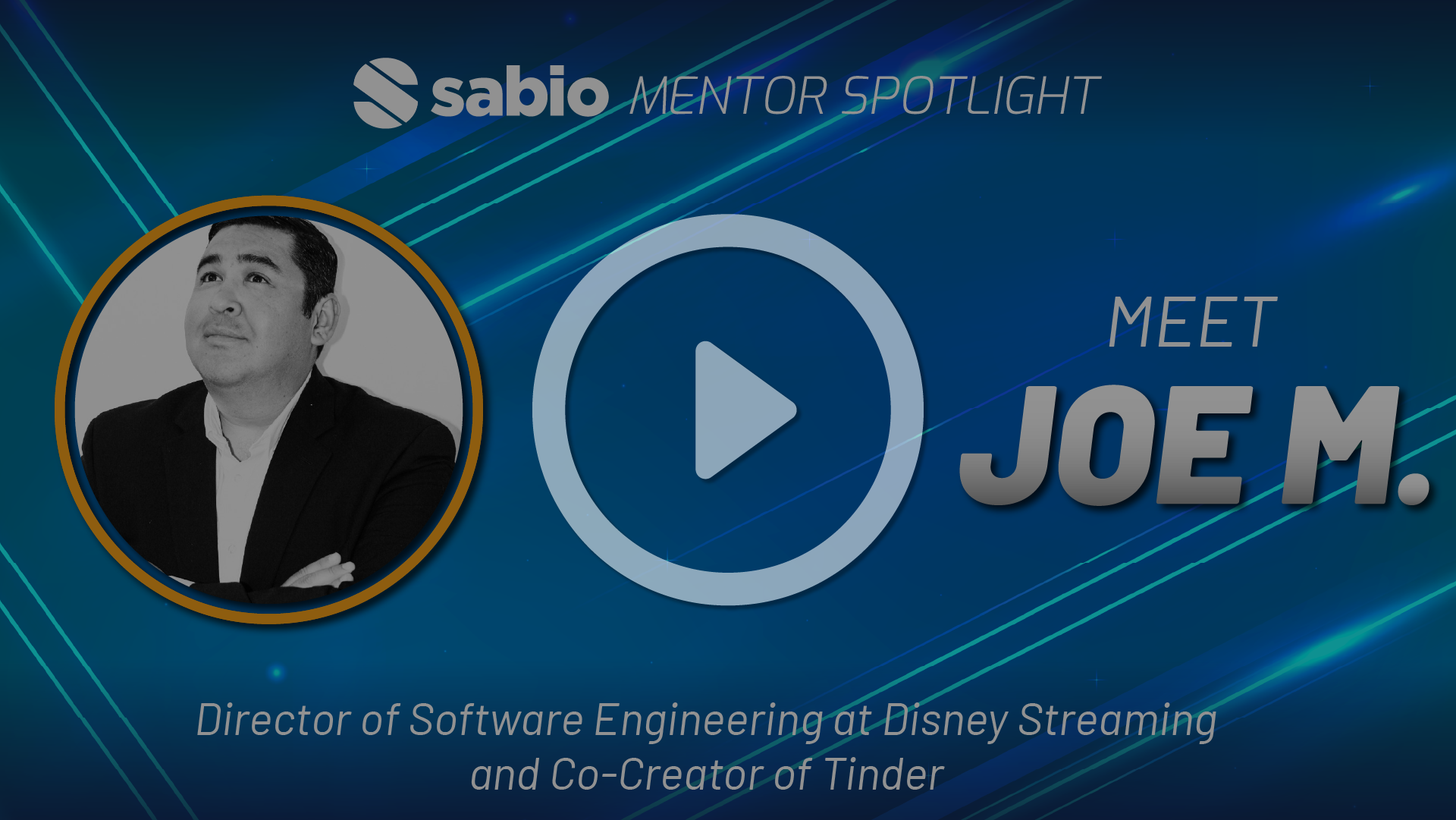Meet Joe M.
Meet Joe M.
Joe M.
I got hired at Hatch Labs. Eventually they paired me with Shawn Red, CEO of Tinder. And so the first day they put us together, you got to do a hackathon. What are we going to do, Shawn? He's like, I don't know. And then so I had been thinking about the work from MySpace and I said, hey, what if he could walk in a room and you figure out, okay, who's in the room that's also on Facebook, and you take their friends and you take their likes, and you figure out who has the most affinity with each other. And the idea was that you could know what topics to talk about somebody in the room. I was thinking, like, go into a room and make friends and Shawn, I remember he was like, Nah, bro should be about dating.
I started taking things apart when I was pretty young, my grandfather, I got in trouble because I took apart a bunch of his eight track players and couldn't put them back together. But I just really wanted to know how that worked. I moved around a bunch of different places as a kid eventually settled in Diamond bars. And when I moved, there was kind of a big change. Because a lot of my peers in Diamond Bar, they had been going to private schools, we grew up relatively poor, I was suddenly surrounded by people who shared my interest.
I was fortunate enough to get a computer a few years earlier, I would just try to teach myself basic. So I took AP computer science in high school. But really, I didn't know what I wanted to do. I didn't even know what computer science was. I just knew that I liked computers, that I had been around programming and I found this group of people that were super smart and geeky types, they were into computers and they started taking programming after school. And I think that was the early thing of finding your niche. Think of that group as like my first mentors. In a way. That's how I got into computer science.
Q: How diverse were your first computer science classes?
Joe:
When I was in high school it was pretty diverse. I didn't really notice that I was one of the few brown people in all these AP classes. It just didn't dawn on me, I got into UCLA, when I joined, I was automatically enrolled into something called the minority engineering program. It's called MEP. Still exists at UCLA. It's called the Center for Excellence in Engineering Diversity. Community became super, super important for everybody. And for me, it was a way to connect with people that have become lifelong friends. Over the years, I joined SOLES, society of Latino engineers and scientists, which is the UCLA chapter of ship, which is the Society for Hispanic Professional Engineers. I also joined Nesby, which is the National Society of Black Engineers. That to me was super rewarding. I got to connect with other people from the same ethnicity and quote, unquote, minorities at the school, those organizations do a lot for the community.
Q: Tell us about your time at UCLA?
Joe:
A lot of the folks that went to UCLA, they didn't actually have experience doing anything on a computer. For me, because I had done coding for a while and working with my geeky friends, they had taught me a lot of the things that you would need to know just starting, and at that time, unfortunately, MEP did not have a good curriculum for computer science. They were set up for traditional engineering, I actually was taking the time to take the folks that started out with me in computer science and help them so I actually did tutoring classes outside of UCLA. The hard thing for me, my journey there at UCLA was that I think I started there was 12 minority folks in the MEP program that started out in computer science. And out of that 12 after the second quarter had dropped to three by the time I graduated from that original class it was two but when everybody joined, they all have that passion, like they all want it to be engineers, it's changed significantly and that you have a lot more resources around it. But it was difficult for a lot of folks coming out of their high school to you know, make it through the program.
Q: How did you get your first tech job?
Joe:
I was actually part of a program called Project Breakthrough. So IBM was trying to bring more diversity into IBM, they were looking for folks to be summer interns. And so I did two summer internships for IBM with the same team, a guy there whose name was Randy really started to mentor me when I graduated, I reached out to him and I was like, hey, you know, I've been an intern for you these two summers, is there a position there at IBM? And he was like, Yeah, of course. And so I joined IBM as a project breakthrough entity. And I think it was like one of the few that actually like went to work there.
Q: What is the typical journey of a software engineer?
One of the things that you have to be comfortable with as a software engineer is failure, it's gonna happen a lot. Developers who like video games probably love Dark Souls, because it's like the same loop, you know, I'm gonna fail, I'm gonna fail, I’m gonna fail, and you make a little bit of progress. And then you get to a point where like, Okay, this is working out. I think the journey as a software engineer is, you start out learning, right? And then eventually you get more expertise and experience. And then at some point, you start to take on a little bit of mentorship becoming a domain expert in a particular area, but you're also helping the other developers who are different levels. So that's then from there, the next thing is because you're the domain expert, you start interacting with other teams. And then from the journey there is you decide if you want to go into like management or you want to continue to be an individual contributor, if you want to stay in individual contributor, next level is architecting. Architects are sort of expected to have broad understanding of development, best practices, tools and technologies that you're using the go to person to vet design at a very high level and help the team to design at scale. So you would go to an architect and say like, you know, the other teams, you know, the components you have, how would you solve this problem? How would you recommend it? The architect would start to work with the rest of the team figure out how To solve some of these more difficult problems, the other route is to go into more like software manager is a point where you can kind of decide where you want to go. I've done both. And I think early in my career, I was more excited about the technical part. But as I got older, I started to feel more connected to developing engineers and developing careers and so kind of ended up going that direction.
Q: How did your time at MySpace lead to the invention of Tinder?
When I was at MySpace, I was actually the product manager for search and recommendations there. This was when Facebook was starting to really eat MySpace’s lunch. And so they were trying to redesign the entire MySpace thing. rebrand, make it cooler. As a first time technical product manager, I was in charge of recommendations. And I remember I asked: How are your recommendations performing? And they were like, Oh, we don't know. We just put them out there. We don't actually check those. They didn't have analytics.
So that was kind of like the first thing that I did was like, Hey, can we have some analytics around this and see how it's performing. And then so based on analytics, it wasn't doing so great. We started thinking of ways to do different types of recommendations People to People, people to content content to content, leveraging that knowledge graph, that was a pretty interesting experience. When I was at MySpace, we were starting to explore the knowledge gap. There was a company that Google bought Freebase. Freebase had an entity graph, like a knowledge graph, so Freebase knew facts about things. And you could use their API to connect things, recommendations that I was looking at my space where things like, if you like, Jennifer Lopez movies, maybe you're gonna like Jennifer Lopez music, because there's Jennifer Lopez, the artist, there's Jennifer Lopez, the person and celebrity, there's Jennifer Lopez, the musician, right, there's all these facets to this one individual at the time, they weren't really connecting the dots.
So they wanted to be able to use the Knowledge Graph to tie all this stuff together. So we started thinking about, wouldn't it be interesting if you could take your social media that you could like, have the Facebook SDK and you could get people's friends and their likes, and this whole thing they got in trouble or from Cambridge analytic, you don't give your permission. But then now someone else sends it to an app, and they have all your information, right. But at the time, I thought it was interesting, because I said, Well, I can go into Facebook, and I can get all your likes, and all your friends likes. And then I can take those likes, and I can put them in a knowledge database or Knowledge Graph. And then I can take your posts, and I could figure out what the subjects are in your posts. And then now what I can do is I can say, these are the things you say you like, these are the things that you actually interact with. And I can say, okay, these are the things that you have affinity for. It was like the ability to sign into Facebook, and then figure out what you're an expert. And that was kind of the pitch was, this person really knows a lot about a celebrity or this person really knows a lot about this industry. Right.
And so Todd and I, when we got our severance packages from MySpace, we said, let's try to do a startup, we hit a startup called tagging robot. And we were trying to get funding for this concept of Knowledge Graph, knowledge tagging, it didn't work out. And so I said, Hey, Todd, we got to make money or we got, we got to figure something out. So he got us a contract through IAC. And I see wanted to use what I had built to do a restaurant recommendation thing. Ultimately, they decided, hey, we want to hire you. IAC had a fund called Hatch Labs - concept called hatch labs. They would give a team money in a small team some money to launch a product in six months. But that product had to be mobile. And it had to be disruptive.
Somehow, I got hired at Hatch Labs to be their technical co-founder. But eventually they paired me with Shawn Red, CEO of Tinder. And so the first day they put us together, you got to do a hackathon. What are we going to do Sean? He's like, I don't know. And then so I had been thinking about the work from MySpace. And I said, hey, what if you walk into a room and you figure out, okay, who's in the room that's also on Facebook, and you take their friends and you take their likes, and you figure out who has the most affinity with each other. And the idea was that you could know what topics to talk about somebody in the room, I was thinking, like, go into a room and make friends like icebreakers. And Shawn, I remember he was like, Nah bro, it should be about dating.
And so I said, Fine, you know, so I built an Android app proof of concept that did that original app was if you say yes, and they say yes, then it's a match. And then you guys can talk to each other. You can chat. That's the everything core concept of Tinder was there in that initial prototype, but we didn't get hired to do that. We didn't get hired to build a dating app. We got hired to build a loyalty app or restaurant. So we actually put that hackathon thing aside, didn't go into it went off and built that app and presented that app at TechCrunch. Disrupt, we ran into an issue with Apple where we couldn't get the app into the App Store. IAC came back and told us well, it's probably gonna take a month to resolve this. And then Shawn, to his credit, let's build the thing that Joe and I did for the hackathon for this month that we have. We put it out and then it went crazy.
Q: Tell us about your current job?
This is like my fourth go around at Disney, I think we're meant to be right but my team does is my team is a core messaging team at Disney and were responsible for push notifications in app messages. It's an interesting time at Disney because Disney bought Hulu, we're trying to merge the tech stack between Hulu and Disney right and you've got these two completely different apps. My team, when I joined, it was three or four engineers. Now we're at the point where we're going to have close to 20 by the end of the year. So my previous position I had two direct reports and now I have an org of 20 with two engineering managers above principle engineer. We work with a lot of interesting teams. Data teams and marketing intelligence teams and The marketing ops, it's an interesting intersection of every different part of Disney, you know, because you also have to work with the front end team. Of course, it's Disney. So I get a little bit of a discount when I buy things at Disneyland. So I'm there like almost every other weekend.
Q: What are you looking for when you are hiring?
When I'm hiring somebody I look for, do they seem like they want to learn? Do they seem like they can be taught? Do they want to teach other people? Do they want to solve problems, and do they have the temperament to be in a room and disagree, but commit? That's one of the key things of a very functional team is you want people that are not afraid to voice their opinions respectfully, and you want people that can hear other viewpoints, or other approaches that don't necessarily align with theirs. And that as a team come to a consensus and work together super, super important. So it's not just being able to, you know how to code or know what a for loop is, or no data structures like that stuff is super important. But it's also showing that you want to learn, showing that you can be taught and showing that you can work as a team. Those are the things that are super important to me when I'm looking to hire somebody.
Q: Do you need a college degree to become a software engineer?
I don't think you have to have a degree to be a good software engineer. I've worked with a lot of software engineers that don't have degrees. A lot of them come from other backgrounds, one of my best friends, he's the CTO at a big company. And he was like a biology major. And computer science is not really software engineering. They're related. But it's not the same thing. Computer science is all about the computation. It's all about what can you compute, whereas day to day as a software engineer is all about coding. It's all about algorithms, complexity, being able to solve problems, and what do you would look at beyond that I think is more experience. If you don't have an internship where you don't have work that you can point to try to build something, put that on your resume, be ready to talk about it think that that's the two things is one, you don't have to have a degree to be a good software engineer, plenty of companies that hire folks out of boot camps as well, big and small. I recommend the boot camp for people that don't want to take that college path and then try to get experience as early as you can. Be sure to highlight that on your resume.
Q: What’s the most important skill for a new software engineer?
When you're starting out as a software engineer, you're really just coding. You don't have as much leadership or mentorship ability when you start, but they're looking for you to add those things as you level up your career. But in the beginning, it's really about your experience as a software developer. What projects do you have? What prior experience do you have? What are some things you can point to that you've built? And the reason is because in my opinion, it's easier to vet somebody's experience and sort of level technically, if you can talk to a project, I'd rather talk to you about something you built and go into detail than give you a coding question coding question. It's so subjective. And so I don't really tend to trust that style of interview as much as some other folks do. For me, it's more, tell me about something you built. What was the technical challenges that you came across? How did you solve it? Why was it difficult? What made it difficult? Where do you go to when you get stuck? What would you do if you ran into a situation? - if you had to do it for your job? To me, that interview tells me more about your abilities than Hey, you have a list of 1000 words and find me the ones that are palindromes, right? If you can tell me I wrote this app, or you can tell me I had this problem. And I thought if I wrote an app, it would make it easier for me to solve this problem. And here's the app that I wrote, here's the tech I used, here's why I built it, here's how it was built. Okay, that's more compelling to me.
Q: What advice would you tell your younger self?
Don't let the fact that you're not the best at anything, keep you from trying to level up your career. It took me a long time to have the confidence to graduate from software engineering, and I probably could have done it a lot earlier. That's probably the one thing I would, if I could go back and redo parts of my career, I probably would have leveled up sooner because I think I had the talent to do it, but I didn't have the belief to do it. So that's like the main thing I'd say. The other thing I'd say is if you're getting into startups in sort of going that route where there's potential upside of money involved, definitely get a lawyer definitely have someone read the contracts because if you don't know a lot about that space, and you're very trusting, it's very easy to be taken advantage of. Those are probably the two things I'd say you're good enough. So take the opportunity if it's presented to you, and then hire a lawyer.
During our Info Sessions you will learn all about our program, and also get to speak with Sabio team members. In addition, every week you get to hear directly from recent grads that are now thriving in tech.

Sabio Info Session

Info Sessions are your chance to meet our instructors via Zoom and to get an overview
of what Sabio and Alliant International University have to offer from our innovative program.
It’s a warm environment where you can ask questions and get over any fears or hesitancy you
may be experiencing.
*All times are PDT/PST



